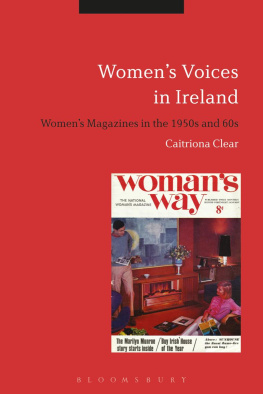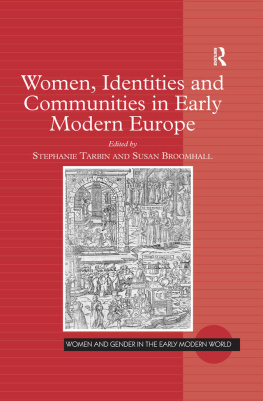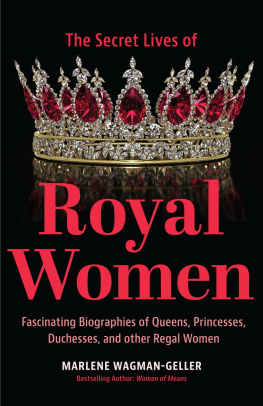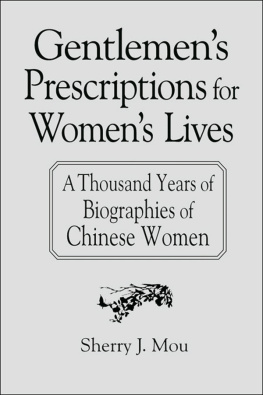The Gentleman's Daughter
The
Gentleman's Daughter
WOMEN'S LIVES IN GEORGIAN ENGLAND
AMANDA VICKERY
YALE UNIVERSITY PRESS
NEW HAVEN AND LONDON
First printed in paperback 1999
Copyright 1998 by Amanda Vickery
All rights reserved. This book may not be reproduced, in whole or in part, in any form (beyond that copying permitted by Sections 107 and 108 of the U.S. Copyright Law and except by reviewers for the public press), without written permission from the publishers.
For information about this and other Yale University Press publications, please contact:
US Office: sales.press@yale.edu yalebooks.com
Europe Office: sales@yaleup.co.uk www.yalebooks.co.uk
Designed by Gillian Malpass
Printed in Great Britain by CPI Cox and Wyman, Reading
The Library of Congress has Catalogued the hardcover edition as follows:
Vickery, Amanda.
The gentleman's daughter: women's lives in Georgian England/by Amanda Vickery.
p. cm.
Includes bibliographical references and index.
1. WomenEnglandHistory18th century. 2. EnglandSocial conditions18th century. 3. GentryEnglandHistory18th century. I. Title.
HQ 1599.E5V47 1988 305.42.'0942.dc21 9745792 CIP
A catalogue record for this book is available from The British Library
ISBN 9780300102222 (pbk.)
4 6 8 10 9 7 5
Contents
A PPENDICES
Acknowledgements
THE ROAD FROM PRESTON TO PH.D. is paved with clichs, but my gratitude is no less heartfelt for its predictability. At Penwortham Girls' Grammar School, my history teacher, Angela Gibson, singled me out and encouraged me, while my parents, Derek and Rene Vickery, made every sacrifice that I might, as the adage has it, go Down South. At nineteen, in London, I was lucky enough to come across Professor Penelope Corfield. She was inspiring as an undergraduate tutor, alternately soothing and bracing as a Ph.D. supervisor, and is now unfailingly helpful as a colleague, but still shrewd as a critic. She will blush, but I salute her.
Institutions that have supported my career thus far and whose financial aid I happily acknowledge include the E.S.R.C., the Institute of Historical Research, Churchill College, Cambridge, and Royal Holloway, London University. Most recently, I enjoyed the Helen Bing fellowship at the Huntington Library, San Marino, California, and an Ahmondson-Getty fellowship at the Clark Library, U.C.L.A. My blissful stay in California was infinitely enriched by Helen Bing's remarkable kindness and the friendship of Shelly Bennett, Tom Cogswell, Karen Kupperman, Amy Myers, Jack Myers, Kate Norberg, Jenny Stine and, above all, Roy and Louise Ritchie.
In researching this book I have drawn heavily on both local and national record offices and the patience of their archivists. The following archives have all kindly permitted me to quote their manuscripts: the Lancashire Record Office, Preston; the Lancaster Public Library; the Wigan Record Office, Leigh; the Borthwick Institute of Historical Research, York; the Yorkshire Archaelogical Society, Leeds; the West Yorkshire County Record Office, Bradford; the West Yorkshire County Record Office, Leeds; the West Yorkshire County Record Office, Wakefield; the North Yorkshire Record Office, Northallerton; the Cheshire Record Office, Chester; the Cumbria County Record Office, Carlisle; the Corporation of London Record Office; the Guildhall Library, London; the Westminster Public Library; the Essex Record Office, Chelmsford; the Kent Record Office, Maidstone; the Tyne and Wear Record Office, Newcastle; the Public Record Office, London; and the Huntington Library, San Marino, California. In particular, I must single out the kindness of Mrs Diana Parker of Browsholme, who permitted me to use the manuscripts in the Parker of Browsholme deposit in the Lancashire Record Office, alerted me to unused documents left at Browsholme, allowed me to photocopy countless manuscripts and was very helpful in advising me of illustrations. Two archivists and scholars who have been more than generous with their local knowledge and unpublished work are Faye Oldland of the Pendle Heritage Centre and Brett Harrison of the West Yorkshire Record Office at Leeds. I am grateful to all.
For references, suggestions, critical readings and intellectual fellowship, I am deeply indebted to Jonathan Bate, Kelly Boyd, Mike Braddick, John Brewer, Amanda Craig, Anne Goldgar, Helen Hackett, David Jarvis, Lawrence Klein, Alison Light, Rohan McWilliam, Charlotte Mitchell, Roy Porter, Lyndal Roper, Naomi Tadmor, Pat Thane, Stella Tillyard, the anonymous readers of Yale University Press and especially Joanna Innes, who has read my work many times over and found supporting examples too numerous to acknowledge in the notes. Successive generations of students on the Royal Holloway Women's History M.A. course have also helped shape this book with their questions and comments. For help with illustrations I must thank Mr John Aspinall of Standen, Madeline Ginsburg, the Hon. Mrs Jackson, Mr Harry Matthews, Mr Stephen Startin, Mr and Mrs John Warde of Squerries, Paul Langford who suggested the cover picture, and particularly Neil Holland, who heroically stepped in at the last minute to sort out my photography crisis. Yale University Press has proved a model publisher. Celia Jones's copy editing has been careful and helpful, while my editor Gillian Malpass has cheered me with her sustained commitment to the book and a remarkable attention to detail throughout.
Yet history is not everything, and it must be admitted that life is more fun than work. For disregarding my academic guise, I want to thank my oldest friends Gregory Battle, Jill Farrington, Neil Holland, Elizabeth Muir and all those wonderful girlfriends who have come after. The completion of this book coincided with the birth of my fearless daughter Hester and is competing with a complicated second pregnancy as I write, so to neglect to mention the unstinting support of my G.P., Fred Kavalier, the Camden midwives and everyone who has helped me at the University College Obstetric Hospital would feel perverse. In time-honoured tradition, my biggest debt is acknowledged last. John Styles has banned the gushing and detailed acknowledgement that I have been perfecting over the years. Still, if life with two demanding women resembles an uphill struggle, then he has nobly put his shoulder to the wheel. This book is for him.
Note on the Text
ORIGINAL SPELLING, PUNCTUATION AND capitalization has been retained throughout. Abbreviation of the, that, which and would, among a host of other nouns and verbs, was universal. Where the text is hard to follow these contractions have been rendered in full in square brackets.
The bibliography and biographical index contain details of most primary and secondary sources cited, and therefore abbreviations for these works have been used throughout in the notes; references to those works not included in the bibliography or biographical index are given in full in the notes at their first appearance in each chapter. Unless otherwise stated, the place of publication is London.
Facing page: Map of Lancashire and Yorkshire showing the principal towns and villages mentioned in the text.

Introduction
IN 1820 GEORGE III DIED, the first iron steamship was launched, Shelley published Prometheus Unbound and an unremarkable middle-aged woman took stock of her past. She took out her old letters, burning some and arranging others, and thereby the ghosts of a decorous life materialized before her: These letters brought back many events, but above all marked the progress of time & how it sweeps into its course over friends over feelings our hopes & fears We here see man in a mirror they appear as when they pass by mere reflections. It is from just such disconnected reflections that
Next page





